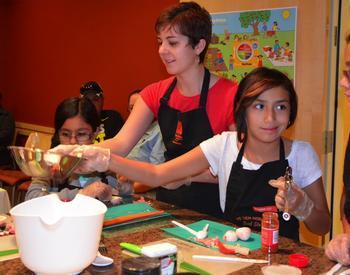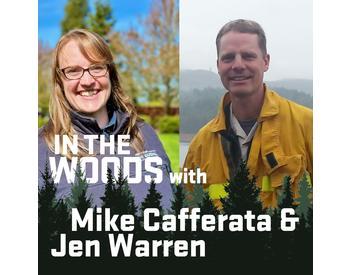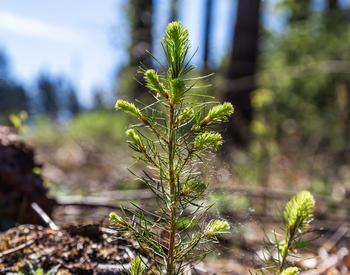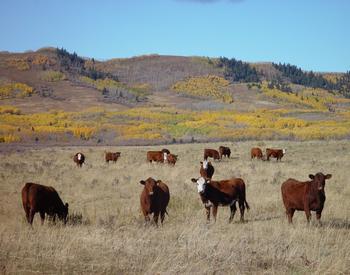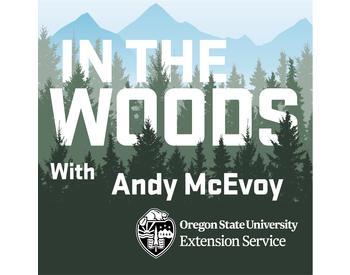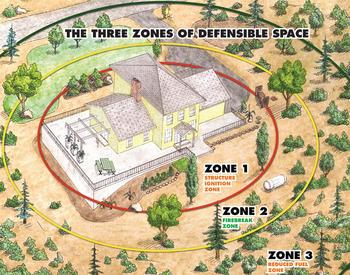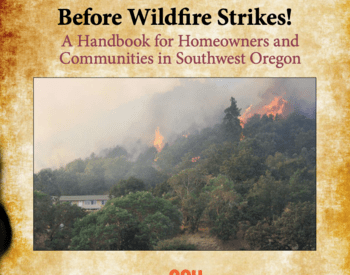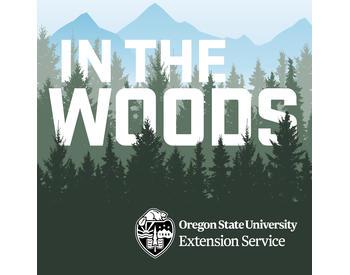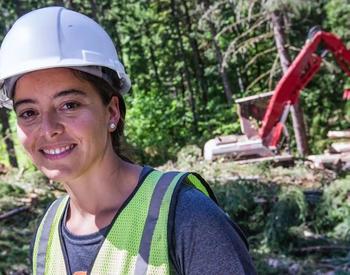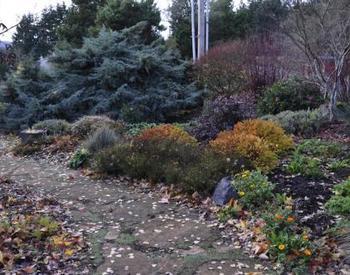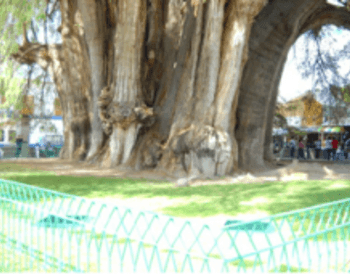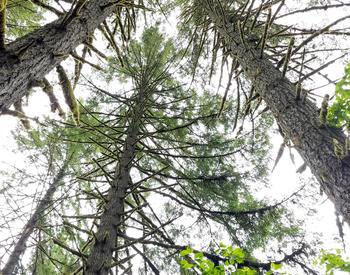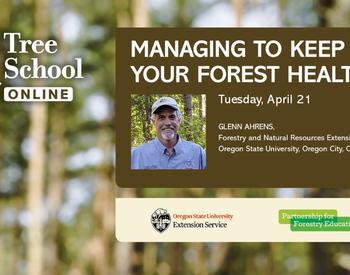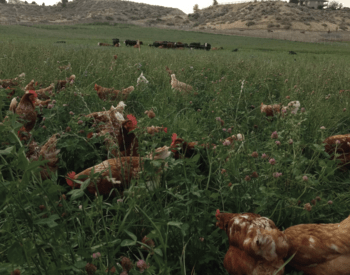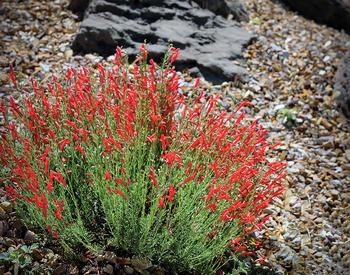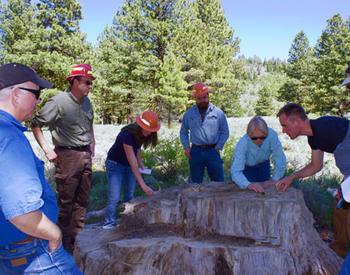Transcript
From the Oregon State University's extension service, you are listening to In the Woods with the forestry and natural resources program. This podcast aims to show the voices of researchers, land managers, and members of the public interested in telling the story of how woodlands provide more than just trees. They provide interconnectedness that is essential to your daily life. Stick around to discover a new topic related to forests on each episode. Welcome back to another episode of In the Woods. I'm your host Lauren Grand, assistant professor of practice and extension agent in Oregon State University's college of forestry. Today is a really special episode, I'm so excited that we're going to be meeting the Oregon State University extension services forestry and natural resources fire team. It's a mouthful, but they're a big group and I'm really excited for you to meet them. This program is truly unique and one of the first of its kind in the country. Welcome fire team. Hi Lauren!
Let's start by talking about how this extension fire program came to be. And Carrie I'm going to start with you because you were instrumental in the development and implementation of this program. So, tell us what's your role in the program now? And how did the program and fire team come to be? Great, thank you so much Lauren it's a pleasure to be on your podcast. So, um I'm currently the fire program manager and my role is very diverse from assisting the director in moving the program towards its strategic goals to managing day-to-day operations of the program and also providing support and direction to the specialist. And so how the fire program came to be? Well, the program was developed based on five years of assessment data that informed us, but there was a real need for education related to uh wildland fire. And also the need to foster the resiliency of communities and landscapes to wildfires. So, fire as you know Lauren is a big part of our ecosystems in Oregon and we really have to prepare for and learn to live with fire. So, my colleague and I brought the concept of a fire program to our forestry and natural resource extension group including you. I remember meeting with you. And together... Yeah, that was fun. We worked um to develop the program from the ground up. The FNR group felt strongly that the fire program should be a program for all Oregonians, and so service areas were created across the entire state of Oregon. So, I just feel so fortunate today to have a fire program team that works collectively and locally to serve the diverse needs and landscapes uh in Oregon. Well so I'm so glad that you know you or what and our colleagues came together to be the brainchild for this program, and that it came to fruition. And you guys are doing so much great work already. Do you have a pet project or a fun project that you're working on right now that you want to share with the group? Oh, man, Lauren that's really hard I have like a million projects that I'm working on that I just I don't know I think I'm a little obsessed with fire I get so excited, but if I had to choose I guess I'd say um I'll go with the prescribed fire projects. So, what I'm hoping to do is provide a continuing continuum of learning experiences where we start with the basics of prescribed fire and go all the way to getting even potentially certified with the Oregon Department of Forestry through their new certified burn manager program. So, just last month we published a prescribed fire basic collections of modules that provided really foundational basic information on prescribed fire. And for those of your listeners who might not know, prescribed fire is a really important tool we can use to help manage our forests in rangelands and it also has many ecological benefits. Lauren I'm not sure how many of your landowners are using it, but it is definitely a great tool in our toolbox that we can use. So, we plan to create more modules and potentially turn that collection of modules into an interactive course that anyone with internet access can participate in. I think it would also be super cool to see those that take the course are offered like a hands-on live opportunity to get out and experience prescribed fire. And so that they can utilize the knowledge they learn from the basic series and develop those skills necessary to use prescribed fire on their land. So, then a next level could be getting certified by the Oregon Department of Forestry uh with through their new uh certified burn manager program. So, there it's it's just all a work in progress so stay tuned and hopefully and maybe you can have me on your podcast again once we get this a little more dialed in I can tell you a little bit more about the prescribed fire experience. That'll be so amazing I have quite a few landowners that are excited about learning more and the potential for prescribed fire, so I can't wait to see where this program goes and I'm really excited to hopefully in a few months or a few years... Hopefully it's not years.
To be able to describe the program for... That's awesome. Thank you so much, Lauren. Yeah, great, thank you. Thanks Carrie. Okay, well um we'll move on welcome back to the podcast, Emily Jane. Thanks for having me again Lauren. So, the last time you joined me we were talking about conflict resolution, but now um you're joining me in a different role. Can you tell me what your role is on the fire team? For sure, um I'm currently the interim director so that means I work closely with Carrie doing a lot of the things she describes and I also help provide strategic direction and then work with all the different state partners that are involved in wildfire. There's a lot going on with wildfire in Oregon in the last few years and so showing up and working with those partners on common goals is really what I do, but conflict resolution is always relevant. I was gonna say I actually think back to that podcast frequently in my day-to-day work. But um not to get sidetracked, um, so tell us about some of the current objectives of of the fire team and what sort of your some of maybe some of those strategic goals are that you have? Yeah, for sure, so our overall purpose is really to use education and boundary spanning partnerships to foster the resiliency of communities and landscapes to wildfire at scale. And what that actually means is that we're trying to provide knowledge and connections so that people in Oregon can better understand wildfire, what it means for them, and how to prepare for it. And importantly how to work together. We also try to be part of and supportive of partnerships that reduce wildfire risk and get lands like larger landscapes big areas ready for fire. So, that means that we we're often part of groups or networks working with all kinds of organizations, other government agencies, tribes and landowners all around the state and you'll hear more about that in a minute from our regional specialists. Speaking of regional specialists we're about to meet each of them, so before I say hello, can you give me a brief description of what the role of a regionals fire specialist is? Yeah, so I think we can all appreciate that Oregon is such a diverse place ecologically and socially so we appreciate and wanted to build our program the idea that preparing for fire is just going to have to look different in different parts of the state. So, the regional specialists who you're about to meet they each serve a number of counties and they're focused on identifying solutions that are going to make sense in the context of their areas and work for people in those different contexts. So, they're on the ground providing education about wildfire to a whole range of different audiences in their regions. They're often working with people like you Lauren are are forestry natural resources extension agents to reach landowners. And then they're also participating in those landscape partnerships that I mentioned a minute ago uh really helping keep all the pieces of those efforts moving forward and making sure that those partnerships are science-based too. Yeah, it's been really great to be able to work with the different fire specialists on regional projects but also their their specialties and to learn more about fire in my own world as well so um thank you so much EJ I really appreciate it. For sure, thank you. Okay, I'm so excited to be able to speak to each of the fire specialists today. Um I'm gonna go in no particular order so let's start with Chris Adlam. Hi Chris, how are you today? What region do you serve? Hi Lauren, I'm doing great um I serve the southwest region from Douglas county down to the California border. Great, and so tell me a little bit about yourself and what you bring to the fire specialist role. Yeah, you know my background is in fire ecology at the way that fire impacts our wildlife and biodiversity as well as working with tribes that use fire for various cultural purposes. Um and so like Carrie mentioned we're doing all this educational outreach around prescribed fire so that people can learn about this practice, maybe they're new to it, but of course the use of fire goes back way way a long time ago and indigenous people use fire have used fire to manage their resources and take care of gathering places, keep wildlife and plant populations healthy and some other communities also pick that up you know like we have ranchers in Douglas county who for generations have been using fire for managing their pastures. And so I think this is really fascinating this relationship that people have with fire and being able to see fire as something other than this scary thing that happens in the middle of summer I think is a real gift. Yeah, it's been so great to slowly see the perception of fire change from something being really scary to a part of our ecosystem and how we live with it, so thank you for helping with that, that mindset. Um do you so it sounds like um prescribed fire is definitely one of your passions within the fire realm. Um are you currently working on any projects that you're really excited to share with us? Do they relate to prescribed fire? Yeah, right now we have prescribed fire training called treks the rogue basin tracks which is giving people the opportunity to learn about prescribed fire by going on these burns on federal lands on forest service land. We also have a prescribed burn association starting up in the rogue valley which is a collective of landowners who are helping one another to do prescribed burns by sharing knowledge and equipment. And making this technique accessible to private land owners we also have a project going on supporting members of the confederated tribes of Grand Ronde and confederated tribes of Siletz Indians who are seeking to reconnect to their ancestral territories down here in southern Oregon um including through the use of cultural burning. Well it sounds great, it sounds like you have a lot of great work going on thanks for thanks for sharing about about it and we're excited to hear more hopefully we'll have you on in the future to tell us how those projects went. Sure, thanks Lauren. Thank you. Okay, our next regional specialist is Ari Cowan. How are you today, Ari? I'm doing great Lauren. How are you doing over there? I'm doing well thanks. So, what region do you serve? I serve the central region which includes eight counties along the east slope of the cascades central Oregon and south central Oregon. Fire's a big topic over there isn't it? It is a big topic. Fire has been a part of that landscape for many many years and a lot of the area includes mountainous mixed conifer forests to different types of dry forests that used to experience a lot of frequent low severity fire. But there's also rangelands out here, agricultural lands and some very well populated and growing communities. So, there's a lot of folks that are familiar with fire out here, but then there's a lot of new people who are moving to this area who are learning about fire. Yeah, well it's great they'll have you to be their teacher, so tell me a little bit about yourself and what you bring to your fire specialist role? Sure, well I am an ecologist at heart uh as some of you may have heard from my previous podcast with you I'm a mycologist and I also I studied fire ecology, fire impacts on soils uh so that applies a lot to the post-fire education and support that we sometimes provide. But I also was a wildland firefighter and I used to help with neighborhood firewise assessments. So, I really like working with people, talking with them on how they can manage their lands with fire in mind whether that be using fire as a great management tool or appreciating the way fire provides for ecosystems and communities or the goals of reducing wildfire risk. Wow, so it sounds like people can get a lot of a lot of great information for you practical and theoretical. So, what projects are you currently working on that you're excited to share with us? Oh there are many great projects going on that a lot of the partners that I work with in my region have spearheaded and I so appreciate being able to join them on those projects like shared stewardship work a lot of cross boundary on the ground reducing wildfire risk. But there's one project in particular that I want to highlight. I'm gearing up for and getting really excited about a master naturalist field course here in central Oregon. We have classes in the field that cover various ecosystems in the area including forests, rangeland, streams and riparian areas. As well as geology, wildlife and other ecology and natural history topics. But the last time that the course was offered the fire program did not exist. So, now I have the wonderful opportunity to come up with in the field instruction uh about wildfires, prescribed fire and they didn't have anyone to cover the topic of fungi so I'm also going to jump in and talk a little bit about that and and that course goes on for two weeks uh where we have 20 different um adult participants who will join us and we will just travel around different areas of central Oregon to talk about those topics. Wow, that's so great how exciting that you get to help develop new curriculum for people that are really excited about learning about the natural areas that they live in and to include two specialties that you enjoy. Yeah. How fun! Yeah, I feel lucky and also I recognize how much it is wonderful to get outside and be able to show in person um a lot of the examples of of the topics that they're learning about. So, I plan to bring them to a site of a fire that occurred 20 years ago, a site of a more recent wildfire, and then also to bring them to a site where a prescribed burn took place last year and talk a bit about that. Wow, that's great I can't wait to hear all the rave reviews you're gonna get from your workshop. Thanks Lauren. Okay, so let's talk to Aaron Groth next. Aaron, how are you today? Tell us what region you serve? Hey, um good afternoon Lauren it's really great to join you. I am the regional fire specialist for the coast. So, I serve four counties in their entirety and then an additional seven counties partially I'm based in Astoria in Clatsop county and I cover all of Columbia, Clatsop, Tillamook and Lincoln counties and I do cover parts of Lane, Douglas, Benton, Polk, Yamhill, Washington and Multnomah counties. Yes, I get the pleasure of working with you in Lane county it's been really fun having you aboard. Yeah, I appreciated the opportunity to be able to contribute to the newsletter that you and Alicia have Canopy View News for your newsletter for Lane and Douglas county. That was a great article on um the fire history on the coast, thank you. So, um tell us a little bit about yourself Aaron and what you bring to the regional specialist role. Um I bring a couple of strengths I think, I'm a pyro geographer I'd say by training, but I'm also fluent written in spoken Spanish. I'm a return peace corps volunteer and was in an environment program in Peru for four years. I have a real interest in landscape ecology and how fire impacts the land and also fire history, but also you know human connection to the land that my colleagues have spoken about before me. I was actually trained by wildland firefighters of Machu Picchu historical sanctuary were the ones who trained park guards and community members in the area where I worked in peace corps. And so I didn't have personal protective equipment at the time but yeah 12 years ago was using sheepskins to you know battle rangeland fires at about 14 000 feet above sea level. Wow, what a special experience. Anything in particular from that that you want to share with us that we wouldn't be able to learn from our safety experiences? Safety is incredibly important I uh I got too far away from my fellow volunteers and community members who were working on that fire and um you know I let's just say I singed my eyelashes and eyebrows and the fire you know went past me I don't know was thank goodness I was wearing 100 cotton I guess. But yeah always safety first and you know know where the people in your team are and know where the fire is and heed any direction from your colleagues in the field. Definitely, this is the second podcast in a row where safety has come up and it is very important we working in the woods we ask you all be very safe, and recreating as well. And I'm glad that your eyebrows and eyelashes have grown back.
Um, so, are there any projects you're currently working on that you are excited to share with us? Yeah, um I would say I've been developing an educational program related to wildfire in terms of coastal history but also the application of prescribed fire on the coast. Um it's probably not applied as widespread in terms of low intensity fires or prescribed fire as southwest Oregon or uh compared to eastern Oregon uh but there are certain locations such as the nature conservancy's cascade head preserve as well as Nestucca national wildlife refuge as well as hopefully uh sand island at the mouth of the estuary of the Columbia river can have application of prescribed fire to achieve ecological management objectives. In the case of cascade head preserve and the Nestucca it would be habitat for the Oregon Silver Spot Butterfly. That's great those are those are cool projects. But it's it's working with watershed councils but then some of the other partners that have come online oftentimes fortuitous collaboration, but Yamhill soil and water conservation district has organized a total of three wildfire workshops that I'll participate in presenting on fire history of Willamette Valley and the coast range. And then also working with educators of the state of Oregon and the Oregon natural resource on-ramp the education program. And then I'm looking forward to Thursday I'll be in the field with Dan Stark forestry agent for class of Tillamook and Lincoln counties. It's the 8th grade forestry field trip at Cape Lookout state park and uh Dan and I will be talking to the eighth graders about wildfire and looking forward to collaborating with uh people in Tillamook. Um, yeah, and looking forward to also plugging in in Douglas county um I have not yet been able to develop programming in Douglas county, but I'm working with my colleagues Chris as well as Alicia Christensen and also Shelby Jean Philly who's within agriculture and natural resources extension for a agriculture wildland fire training specifically for agricultural producers within Douglas county. I'm looking forward to building out my contacts within Douglas county as well uh yeah thank you. Yeah, that's great those are some good things I too especially love those workshops with the kiddos they get really excited talking about ecology and fire and I think I hope you have a lots of fun. Yeah, I'm hoping to give them a lot of tools and I think it's important that young people use geospatial tools with regards to both natural resources land covered change as well as fire and understand how different data sets are used. Yeah, geospatial literacy is incredibly important from a well geopolitics perspective of course but also in terms of natural resources and fire. That's great they're lucky to have you, thanks Aaron. Okay, next up on the docket, John Rizza. Welcome to the podcast! How are you today? And what region do you serve? Hey, Lauren, yep we're just enjoying another day in paradise over here in northeast Oregon, so thanks for having us. Yeah, living the dream, huh? Somebody's got to do it. Okay, tell me a little bit about yourself and uh what you bring to the fire specialist role. Yeah, appreciate that Lauren so I live up here in Union county and cover uh seven full counties and three more partial counties in the area and have really unique opportunity to work with our partners. I came out of Colorado State University extension with a partnership position with NRCS it's been about eight years down there kind of getting my feet wet and learning how we do things in extension and really appreciate the opportunity to try and help people move forward in the realm of fire. That's great so tell me what are you doing to help people these days, what projects are you working on that you want to share with us? Yeah, it's great Lauren so we are working across the northern and southern blues to help local communities address their needs related to fire whether it's prevention or preparedness or awareness for that matter. And really helping to promote those education and outreach opportunities that we're so good at here with extension and there's a real focus on the strategic approach to how do we address those risks and then actually do something about them so that we're in a better place when the next fire will come because it will not if it's when. So, is there anything in particular that you're really trying to hone in on to your constituents over there or the participants that are involved in your education programs? Yeah, we have a whole bunch of stuff and I think you know you heard about a bunch of those different educational opportunities from everybody else and then additionally uh I point out that we're really helping work with our partners to implement the funding coming from the senate bill 762 for this year which actually goes to implementing projects on the ground and so that's really important to educate the landowners and work with all our partners and be strategic in our approach to help us actually accomplish some good cross-boundary type programs that reduce the risk to these communities and provide these people with the tools they need to be better prepared. That sounds great we always hear that fire knows no boundaries so we're glad you're working on a landscape scale and providing some education and on the ground support too. Yeah, we do the best we can there's a lot of territory to cover, but that's part of the gig and maybe we can get some more of us running around out here to help you all out down the road. Sounds good, thanks John. All right, last but definitely not least we've got Katie Wollstein joining us. Hi, Katie. Hi, Lauren. How are you today? Uh doing well thanks. So tell us a little bit about your region? Yeah, well I come to you from southeastern Oregon. I'm the rangeland fire specialist on the extension fire program um and so I cover Harney and Malheur counties. Uh Parney is the largest county in Oregon uh but we have fewer than eight thousand people and so I like to remind people that cattle outnumber uh our residents fourteen to one um and then Malheur county is in the far southeastern corner of the state and 94 of that is range and so I feel really happy and lucky to be out here in one of my favorite ecosystems. Wow, that sounds great, so you're definitely the special specialist because you're focused on rangeland, right? Well you shouldn't tell the other specialists that but but yes rangelands are special to me. So, are there um so tell me a little bit more about yourself and what you're planning to bring to your fire specialist role? Yeah, so my my background is actually in range and policy and governance um and so some people are going well "What the heck, why are you in fire?" Uh well rangeland fire is um really neat it's it's a complex issue at the intersection of range management, range conservation, but also land use legacies and socio-political factors and rural livelihoods you know most most people make a living out here ranching and so ranchers culture and livelihoods are intertwined with whether fire occurs and what happens after those fires occur on the range. And so I view ranchers as essential partners to creating fire resilient landscapes. And so the big question for me out here is how do you do this when over 75 percent of both Harney and Malheur counties are public lands? Um so I feel really lucky to have the background they do which is figuring out uh the different kind of administrative tools and values and resources and capacities that all the different partners have on these vast landscapes and thinking hard about how do we mix and match um those resources, administrative tools and capacities across landownerships to reduce overall wildfire risk, and also improve those outcomes of range and fire. Wow, that sounds great it sounds like you're one of those people where I always want to go on a trip with you because you've got all the tools in your bag and I'll never be left needing something. That's very nice of you Lauren. So, tell me how how you use these tools that you have and you bring to your role um to work on some of the projects that you've been working on what are something what's something you're excited about that's going on in your region right now? Yeah, well um you know like I said the the tough thing out here is we have so much public land um and again the main land use is ranching which means the landowners out here the ranchers um have a vested interest not only in protecting their own properties from fire, but also they're invested in what happens to the grass that they lease on those public lands for grazing. And so like I said they're they're kind of a great partner because they're highly motivated um I have our partners call them uh human infrastructure scattered around the land state and so I really value that we it allows us to think more holistically about how we move across strength and how fire risks not only within years, but from year to year, so how do we nimbly deploy treatments as needed um you know depending on what precipitation looks like in April and May. And so one framework we're adopting to do that out here in southeastern Oregon has been in partnership with the Harney county wildfire collaborative which is housed by the high desert partnership here in Burns, Oregon and the framework is the potential operational delineations and it's a way to integrate rangeland management with fire planning. And so thinking holistically about fire uh where our activities before so pre-fire treatments are complementary to our activities during so suppression fire response. And then also we have an eye toward what we're doing after fire, and so you know where is the best place? What is a priority for uh restoring and rehabbing places that have been affected by fire? Because we can't we can't do it everywhere we we get really large fires and we have really low rates of restoration. And so the pods framework with this group is just a way for us to all look at a landscape and aggregate it spatially so that we're able to start prioritizing you know where will treatments be most effective to achieve those post-fire outcomes that we'd all like to see. Wow, that sounds like a great project and a great way to support land stewardship on such a large region. Thanks for all your hard work. Thanks! And Lauren, sorry Lauren this is EJ again I wanted to jump in and say we do cover the whole state of Oregon. Uh right now we're actually hiring a new colleague to join us who's going to serve the willamette valley region including a lot of the main urban areas of our state and the foothills of the cascades, and so we look forward to rounding out our team of six specialists soon. That sounds great I'm excited to meet our new specialist soon. Hopefully we'll be able to have them on the podcast so they can share their interests with us too. Get to them early Lauren. I know I love my teammates I gotta I gotta make sure that we everybody hears about what great work that they do. Well, um we got to meet everybody and thank you so much for joining us today fire team. Fire is a big topic and it can be daunting, but we're so fortunate to have all of you working hard to offer these educational opportunities and resources to landowners and other natural resource professionals it's just so great to have you all working so hard thank you so much. So, as um you're listening today if any questions come up or we didn't cover topic related to fire that you were interested in don't forget to drop us a comment or send us a message on our website inthewoodspodcast.com but don't leave us yet our lightning rounds next stay tuned to hear about all of our fire teams' favorite tools and trees. Okay, everyone welcome back to our lightning round as usual we have a few final questions we like to ask all of our guests. This will truly be a lightning round since we have so many people um it's gonna be a doozy so stick with us. All right everybody, what is your favorite tree, Carrie? I'm gonna go with, Lauren, the Tamarack. I'm from the midwest that's what we call it, but out here you all call it the Western Larch. Thanks Carrie. How about you, EJ? Definitely the Oregon White Oak I live surrounded by them. Wonderful. Chris? Well, I'm gonna say the California Black Oak. All right. Ari? I'm going with the Pacific Yew. Hardy and long lived, but you know smaller tree. A great one. Aaron, how about you? I'm from Wisconsin originally and have a lot of family in Louisiana, I guess for the pacific northwest my favorite tree would be um Western Red Cedar. That's a good choice. John? I think today I'm going to have to go with Ponderosa pine because just about start smelling really good whether you think it's cream soda or vanilla or whatever, so that's what I'll choose today. Definitely makes you hungry when you're walking in the woods. How about you, Katie? I'm gonna be defiant and name a shrub, I love sagebrush. Good for you, not a lot of trees where you are, right? No, except invasive or encroaching juniper, excuse me. Right. Okay, great. Wonderful answers, beautiful trees and shrubs from all of you thank you. Okay, the second question that we ask is what is the most interesting thing that you bring to the field with you? Should I go backwards this time? Ah surprise! Katie, what's yours? Oh boy uh can I have two answers? So, I always bring coffee everyone who knows me well and I think that's everyone here uh I'm more pleasant when I'm caffeinated adequately, but I also bring my audio recorder um it's helpful for you know if you're having interesting or important conversations, I like to have it. That's great and I think a new one to the podcast. John, how about you? Yeah, I like the food one I'm not sure if taco's go into the cruiser vest too well, but gotta have some food. But but the more unique thing or the thing I like bringing with me the most is my dog, but that gets hard when we're doing fire so we throw our little orange vest on and go run around the woods and that's our favorite thing to do together. Always fun to have a cuddly friend with you. How about you, Aaron? Oh that is challenging um I think it's really important to have uh GPS I think the recording of GPS coordinates you know and writing down of attribute data is really important and yeah it saves you know it automatically saves your waypoints in the GPS, but you know I'm always of the opinion you know you have your GPS, but you also have your field notebook with a pencil and yeah anyway that's you and you write it you write everything down including the um you know lat longitude or you know whatever you know field notes you want besides entering it into the GPS. Yeah, great Aaron I feel like that's the perfect answer for you. Ari, how about you? I always make sure to bring uh this special knife that I have that also has a brush on one end um sure that sounds like a mushroom knife that you could brush off any soil off the mushroom, but also um it's great for brushing off really cool rocks that you find um so that's what I like to bring. Great, thanks. Chris? Yeah, I always have my binoculars with me um even for for any kind of field trip and uh it doesn't matter I'll always find a bird to watch uh if I have a spare time and and then you can also flip them around and look up close news to them as a magnifying lens for botany purposes, so very useful tool to have I bet if you were really talented you could even use them as a lens to light a fire. I haven't tried that that's my project, now. Look at you teaching me something new and reminding me of middle school.
Okay, EJ how about you? Uh you won't catch me without my EpiPen, really important. Oh, yes. All right, Carrie what's your... Lauren I'm gonna I'm gonna go with duct tape. Duct tape, you gotta use it for everything. Oh, yeah. All right, Carrie and while we're we're chatting here I also usually ask what resources um can you share with people who are listening um that um if they want to dive a little bit deeper into learning about the fire team, where where should they go? Yeah, great thanks for asking well we are on the web we have a fire program page on the extension website and you can find us at extension.oregonstate.edu/fire-program. And so a lot of resources are on that website uh from fireware fire prepared webinar recordings um to the new uh prescribed fire modules I talked about earlier. And also you can follow us on twitter if you like to tweet we're @OSUFireProgram and so check us out on social media as well. Thank you so much, oh fire team! I was so excited to get to talk to you and have you on the podcast. I learned so much about what you're doing around the state I can't wait to hear more about all the great things that come out of these wonderful projects. I'm so glad you could join me um this concludes another episode of In the Woods. Thank you all so much for listening. Join us in a couple of weeks when Emily Jane and Carrie come back to talk to us about fire adapted communities. Until then, what's in your woods?
Thank you so much for listening show notes with links mentioned on each episode are available on our website in thewoodspodcast.com. We would love to hear from you, visit the tell us what you think tab on our website to leave us a comment, suggest a guest or topic, or ask a question that can be featured in a future episode. And also, give us your feedback by filling out our survey. In the Woods was created by Lauren Grand, Jacob Putney, Carrie Berger, Jason O'Brien and Stephen Fitzgerald who are all members of the Oregon State University Forestry and Natural Resources Extension team. Episodes are edited and produced by Kellan Soriano. Music for In the Woods was composed by Jeffrey Hino and graphic design was created by Christina Friehauf. We hope you enjoyed the episode and we can't wait to talk to you again next month. Until then, what's in your woods?
In this episode, Lauren Grand gets to know the members of the OSU Extension Fire Program.
